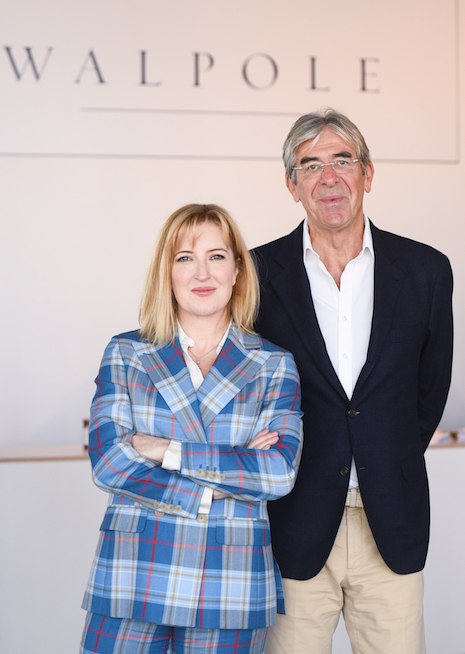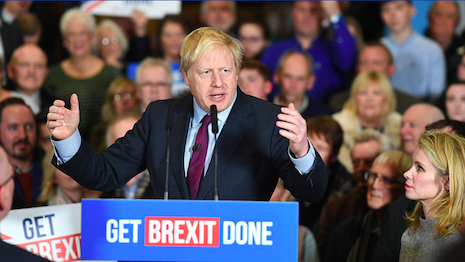A steamrolling majority in yesterday’s general elections for Prime Minister Boris Johnson’s Conservative Party means that the United Kingdom can now get on with the business of getting Brexit done. Eviscerating the Labour Party margin, the Tories won 365 seats, up 47 from the previous elections and the biggest electoral mandate to the party since 1987.
What does this mean for British luxury brands that seek clarity on the future relationship between the U.K. and European Union, which buys 42 percent of British luxury exports and has heavily integrated supply chains across the continent? Without doubt, there is apprehension among members of Walpole, a lobby for more than 250 British luxury brands.
“Walpole members will welcome an end to the uncertainty of the last three years, and historically a Conservative government has offered the conditions in which British luxury thrives, but we remain concerned about the timetable for the negotiation of the U.K./E.U. trade relationship,” said Helen Brocklebank, CEO of Walpole, London.
“Completing something that works hard for the high-end sector in just 11 months from the 31st January withdrawal will be challenging,” she said.
“For British luxury businesses with deep supply chains through Europe, the devil will be in the detail of that trading agreement.”
Walpole members include Bentley Motors, Rolls-Royce Motor Cars, Burberry, Alexander McQueen, Coutts, Fortnum & Mason, Johnstons of Elgin, Henry Poole & Co., Manolo Blahnik, Net-A-Porter, Selfridges, Harrods, Tiffany & Co., Asprey, Holland & Holland, Claridge’s, Farfetch, Church’s, Turnbull & Asser, Rolex and Facebook, among others.
John Bullish?
Mr. Johnson, who first took office as PM in July after Theresa May resigned, has promised to pull the U.K. out of the E.U. by end of January.
With “no ifs, no buts,” he intends to have all agreements between the divorcing parties signed by end of next year – a tall task as decades-worth of regulations have to be reworked or undone as part of the hardscrabble negotiations expected in the months ahead.
The divorce could hit British luxury hard.
The British luxury business is growing at more than double the rate of the U.K.'s overall economy.
According to a report earlier this year from Walpole, Britain’s luxury business has achieved almost 50 percent growth in the four years from 2013 to 2017.
Propelled by exports, tourism and manufacturing, the British luxury business is now worth 48 billion pounds, or almost $61 billion, to the U.K.’s economy.
“These figures demonstrate the exceptional contribution British luxury makes to the U.K. economy and to the reputation of brand Britain worldwide,” Ms. Brocklebank told Luxury Daily at the time.
“Few other business sectors can demonstrate growth of nearly 50 percent in just four years and, against a challenging political backdrop,” she said.
“This is a sector that continues to demonstrate a commitment to investing in U.K. manufacturing and creating sustainable employment across the country.”
Cross-sector contribution
In 2017, the British luxury sector’s exports reached 38.5 billion pounds, or $38.8 billion, up from 25 billion pounds, or $31.7 billion, in 2013.
The leading export markets for British luxury goods are the E.U., North America and China.
Since 2013, the British luxury industry has grown 9.6 percent per year, on average, compared to the U.K.’s overall economic growth of 4 percent.
British luxury goods encompass a wide breadth of categories, including apparel and accessories, watches and jewelry, fine wines and spirits and car manufacturing.
Luxury car sales accounted for 31.4 billion pounds, or $39.8 billion, in sales in 2017, almost two-thirds of all luxury sales. More than a third of total sales from U.K. automakers are high-end vehicles.
Apparel is the second most valuable luxury industry in Britain, contributing sales of 5.8 billion pounds, or $7.4 billion, in 2017.
Although luxury hotels had more modest sales of 1.6 billion pounds, or $2 billion, in 2017, tourism is crucial to the British luxury industry.
Affluent travelers spent an estimated 4.5 billion pounds, or $5.7 billion, on luxury goods in the U.K. during 2017.
Walpole estimates that about 70 percent of British luxury businesses, including Bentley Motors, Rolls-Royce Motor Cars and Burberry, manufacture at least part of their products domestically, benefiting the economy while emphasizing the brands’ appreciation of craftsmanship.
Luxury businesses currently employ 156,000 people in the U.K., both directly and indirectly. Many British luxury brands, including automakers, differentiate themselves by investing in apprenticeship programs for a highly skilled workforce.
While Walpole’s report only includes data through 2017, British brands have continued to find success.
In 2018, British automaker Rolls-Royce Motor Cars celebrated its highest ever annual sales. The Americas kept its position as the largest region in sales, but all markets saw year-over-year growth.
In tandem with its sales growth, the automaker also broke a record with its apprentice intake, with the highest number of individuals in the program at 23. In addition, Rolls-Royce added a total of 200 new jobs (see story).
Brexit and business
Walpole estimates that in 2019 alone, British luxury could see sales between 51.1 and 57 billion pounds, or up to $72.3 billion. However, this forecast is highly dependent on the outcome of Brexit’s negotiations.
Parliament since 2016 – when the U.K. voted 52-48 to opt out of the E.U. – has struggled to pass a Brexit deal, which this summer resulted in the resignation of Ms. May as prime minister (see story)
Some brands are already feeling an impact from the chaos associated with Brexit.
Three-quarters of British automakers believe a “no deal” split from the E.U. would have negative repercussions across the industry. According to a member survey from the Society of Motor Manufacturers and Traders, one in five automakers have already seen a loss in business (see story).
More than 40 percent of British luxury goods are exported to the E.U., compared to 23 percent and 11 percent to North America and China, respectively.
According to a prior report from Walpole, British luxury could lose almost $9 billion if the U.K. leaves the E.U. without any sort of deal. Additional tariffs, taxes and regulation differences between the U.K. and the E.U. may cause a fifth of British luxury business to be at risk (see story).
“We look forward to continuing this kind of robust growth, not least in exports, but the threat of exiting the E.U. without a deal remains and would cost British luxury businesses 6.8 billion pounds in lost export revenues,” Ms. Brocklebank told Luxury Daily over the summer.
“Now is the time for policy makers to provide distinct sector recognition and to guarantee a suitable framework to protect the growth of the U.K.’s high-end creative and cultural industries,” she said.
 Helen Brocklebank, CEO of Walpole, with Michael Ward, managing director of Harrods and also chairman of Walpole, at the British Luxury Showcase in New York Oct. 25, 2019
Helen Brocklebank, CEO of Walpole, with Michael Ward, managing director of Harrods and also chairman of Walpole, at the British Luxury Showcase in New York Oct. 25, 2019
Won nation
Mr. Johnson campaigned in the past few weeks as a one-nation Tory, promising no increases to income tax, value-added tax (VAT) or national insurance. He said his government will invest more in science, schools, apprenticeships, infrastructure, clean energy and green measures to reduce carbon emissions. Add to that Australian-style, points-based immigration controls.
Many of these manifesto commitments affect affluent Britons and Europeans resident in the U.K., as well as companies with local headquarters, plants and operations.
A major beneficiary of this newfound political stability is upscale real estate across the U.K. That certainly is the view of Knight Frank, one of the leading property brokers worldwide with U.K. origins.
“My view is that the election is a game-changer for the prime residential market in London and the wider U.K.,” said Liam Bailey, global head of research at Knight Frank, London.
“The London market, in particular, has experienced weak trading conditions since stamp duty (purchase tax) was increased in late 2014,” he said. “Since then uncertainty surrounding Brexit and the political situation in the U.K. has meant pricing has fallen further and faster than in any major global market – with prices in central London down by upwards of 25 percent over the past five years.
“Add in the currency discount as the pound settled at a low level due to Brexit, and the purchase opportunity for domestic but especially foreign buyers is immense.
“What was needed to unlock this opportunity was political stability – and last night’s result provides this in bucketfuls. Demand is already rising. We have seen several prospective renters change focus to the purchase market and supply will rise.
“For this reason, expect the recovery to be experienced through rising sales, but not immediately through rising prices.”
That said, now comes the hard task of figuring out quid pro quo arrangements between the U.K. and its biggest trading partner, and the status of E.U. citizens in the country.
A BIGGER POLITICAL mandate could have Mr. Johnson playing hardball with much more ease. But disagreements could also lead to the E.U. hitting the U.K. in its soft underbelly, affecting the flow of luxury goods and services between the two markets.
“With the biggest Tory majority since 1987, Mr. Johnson is also now free to push through whatever kind of future relationship he negotiates with the E.U.,” Walpole’s Ms. Brocklebank said.
“Whether he opts for a basic trade agreement and pivots the economy towards America and Asia, or chooses to forge a much closer trading relationship with the E.U., remains to be seen, but the comfortable majority ensures that he has the license to choose,” she said.
“Nevertheless, Mr. Johnson has previously ruled out extending the transition period beyond December 2020, and the timetable for negotiating the future U.K./E.U. trading relationship remains extremely tight, and so the optimism British luxury businesses may feel at having a majority government will inevitably be tempered by caution.”
{"ct":"JpIR5CyRLs0pJ4sLwoqinGDZKVS1H95NoqZQfRIRe8JJPg3WJCtoamL9S4jenTo1hpdKANkNchXpXGKcIKE+ya0NU3NySSCGzlshwogE9UgFWnleIhUvCppD6q43TeX0dbkLEx0VFd372MLe+FEWLQkLz+pJ67DvKowZtjbvYQw41pcQSvbfLCiS2JmyboensHq+njbJ8lOx45tlhI+eYklOy0Amh9xt0232AZvy6rLfvIvM\/2iZM\/erG0dqMiPZuFGDURXmKy8iTDXsBUhXhsAiz1yH83ycgty0tC3V1GjmYv78fB3nNYKaItRHQ2OL9DaZTs4jt1wJCWoB3pClcPMxGOz4oAbMvwYXJ68aQrVjkm11+Cn557uTAQbdHKsrShQ+QoGbEhZBM\/YJcjCEDUGfad8hw9snfiDGMlW56dNSSKpKIMMkYmCb7jeIvErxAj1XUzkwQCKMZUEqWIozNARBlfdHlPEK7y7ezlWqIxHuxQbXYK069DDUoLOQhmSnPsViZCvbKVY18agRE0x2yBmudzVzFp6\/ZVWvkC2VXJ7o8J+0jInJe61wnEfg0sJbxnJkxzXB1qSuhgfDfNPCU8JNXlRgeZVfVHTMpdGWClK57d1bWbtsgkN5xDdZQh2VHgsqSIWMl55AQ4rNGB3xgJi0yqJCjGydJKuJfEO2AXa7sRgCGZD4p7ThLSKuhv9uhNZMZ90HSJ9Krp34Vk5+vJGc5yc76EF8UPgBQ5zsLK9yLpTACo2xOpK5FKj1Xfoul9yMLVuCXaoC6CR1lYkG3Gk0GKgdqkiQmhSVL91y5CAX09ePuU0AXqOD1ADN2SKvxkLjq0ldEdODUbsY\/qkKPhBIhUCMYEqCb20aAMCAzbaY\/jA5Jy1WtklnqhFMPTBq85jv+33Dj7FHkq1d9w0W1EzQDZtAOhKthFaaBcmdvr7ukjpz6EQvM3KkkF3pfK+VGZ4MXGzQu1UkepBg3LnVMqAN5rFVZfNlVMBsxz6\/IVkdAA34UJmIeEKGB2oRE8Hxlgg1AGdxlcxjpIBV5Orf0AdGA8dvknpyHji+k0IhV791MDQtUobencwUA68TDtx6MtLowUQSW6WIWUFwNG0IoDirC2BbF+9+jZvjKjCwYLCLzINOpTM1Y6lbquBEx8BZTKZWfJ01Nb8RkOhOokKvlLaDVBg\/\/q3j2KelgCgwzoJOwEFmbM+owen+nMcX6U0Hz7iueDdlZIc3zq9xlAoRCIf\/GE7MhGMIQLaA4Aqnqg7j0MDKSm1spb2P5Nf+iC9zMr6AumvOJyvJMbNeo7NT8lWKqGOlkhDl7A8JAw5HGYVKi497t2DjC0iHO5HuVTRYdZkMZJf2n6R4bbIOTxd8NdLhOQuC\/Q1VaZ\/Chna3a7qVd9vHrhHIHJgMiqketlPpAQwiSezgfZvULQrz8ImgvLMZAlaC+fSQUUQJX\/l9bTsgZW+oW5cV6GQRXDE\/8\/7l\/xe4aukdZ+6+RmlpoZjs8m1p9Ioa1\/6HpaPQI3AfltQ5ryFt5Med1TDdgd3913PQVI332MfI4on9W4hRlsYjSGek9bwtm+6ymmcX4AG80bi76+pOiawhC5qtNj\/gs4X5Vgx64OKNJFakLg+Iz12Lll94XqDcgf2aptVVNSDwVfUfCqJk9mZxxMyLmeffW1TbJXhVU5b3lYYe+Gc2akRpvirPpQdfspv7RbsMZmFxwcN5+Ed1uMoEJjd3Yzv66++4AARgdQk63L4bJlkgvoNTQN31AV8P0Rz8AE6mH7QVVYs4CZTbm9fVI3w8FmPgfhKSmkx8r6QswIpWU69arDtDLXDVZnY9galeAOWkcnjCJEJaebrULJDlc5VuTW5N6dgYRqGSAffIfyolC5ybgy\/a70kPjZCMiY54JjvEQ0HDBif7UUhSVrZMe+B45gS1aQW6+x6ACcdi9gup6Z\/JRNWSUDFCg+AvDQ+xfAJMxZ8zQERO3ZM0UErTEwUT2tQ6xBjQEDqzCa37ySo39R+6TbfwkUWunjxGQyJMQEJwZ3gELr8bXZHtSoukjjT2awS0we11IWovTGDoSQwWTq+MDkH0Co0YW1f\/e4jAVAaQUhSa1iaYYDS+6ysJfAUYa4zUhld5OQJguu0BbLTRkKqLpDlxFYIlUgegEiwFaUbTwkQn9PbRYG5PeMv6MYVbB+8m3olDxRIuGlY3IE2nXHu772g1DdKu8WD8GeeTQvjbmTYUHSyPBQzT\/3z4nhu+9aqPNCdon3JqVsOj0qfVZilexPJ3ybw89QIDxGgTY6giwpzkIrALCTZQL7lf+JrmHmqyBkLW8fTD2rUHiz6jn2wuZ04O6nlea6iElRW43MIINiPvGCLeIUxBsHBiXELhsvnb+LcpLokzI5fAVjnsEwtxL9T+jR7vk1ycBgHyJyTQXTfdruHtNbXMSSnzhRH+FBPR1cKps5CVV1JWnTAhKKmjGQ5YrEowtrOstfOs9sOpN6431F+iFZxdl5ElVYJN\/gYqKzhazNzq2a80TKR+QX\/TRGMtKu5hTYqVqJL4BzMjY6xug5Cp0amfTFReaRhmAUqrL93y4t1ZQkSKn868rqm1Dr0+gIX38kIfOCSHAAftVpY3SkaJpHQD+odcAvqcp6UJ35Bb1ZSi47AUL+oEI+6gg0QmtbBskBRx38lajjLbFl3aUFfPMWFkCujNTlwjlV3luEuYm1g34zWwOSU439kgacFdHKYzwobUSi5jFW0IYvFfWLD4C2ZAkxzZzaz6X9Fft3fbA68nIiCmEw6ORUn+KDUa57lTL96JF9Y9zdLDfVzEvQmTG6LNTsW917Y4WNsh5DOfdDjknk1ce618YTzuAaNZ6j8uKPOGWIbX02LinJ+7r4kgs84zU6jv6wcYEkVCtC7sbVvSKqN7mgWfEu1VzM1mSoIEMj3a+hK+gmk6DrBoIjTSglr46LH44C\/yZtlAM3g2uZO1eVf+iJuLsX5Np56Ry8iBMizoIdnxtIVnOhJOGcivEhQ1g4L3VuX4wENstGN73RAzMmmyf2+iuSPb93JBfIDbuMddajHa6Wmyc4xgofwgjNkIFXgAbwUMHBHxug1mpmejzXt1lLJFQWXNQEaPkeuSrH40\/nWshWJbYM+zYx8Q2jweQgUM7p+tBTBKTxES1bbWo4Yl95Cm63uJVI9RXsmbOLT4gfXPK3UO5QpO+WL\/zbQlLFaj2p9ILbrnGQpauIhPOhVmU3GgTxnsEml1jWXHHDvIHwKxWQQGw6ZVDHhuoA+K1xCk30Nh1Rxzn4Q8kAgDNX3sMLEdPg7YgsI2leVMwekEV0jlUMHefrPNzZAvwqOgRWtVI7\/omDANsd99+q2i3qFlQId5wiwe+eG6ZDrrhgNBAWeoAh5qyMtsMlhRubR2yo9kPVe2UNGNmJIN\/IqD9yczQhOKLE9qNa9KI1kPviPT8g7KIsyq0U0U6zN+4gXMj5SCHVTt6bq+5ww1\/76t20xKVWUazyAa25R52SLCtX9mWiDmD3tVBwSjcoiYXvCUB1eVGHP0yM+Yc8Kym9TSCinC+Io7FZhu+qhducaKPPAOym5VuEdolPY5uBgkLu03wZYGwiEWzHgCaPn7gc4AFtmidRLch4ejYv8pu1USHQuLkpUUmM7ONcqXc+fJLUsk0Wdq4fR7sZTf8HDv8\/3F6lSCTYY629wxtKYoFeAD35DSF08jgbVpgTBjg1rf6v0Gk9rI0WzORRLCegNxQUCwXfE12iRJ3yegy2g2WnXN0p+p\/6GEy7RTyTfG5I1563D63MikoaNIKVKaBvBccgVa7z7DXhOfdSD5qf90GKF\/HdvPviDPAt0O2+U+YHoRzhmC6EupCInQRLzI4jZhROXFMYHxeqKMBlhthCgHXLrxluFeRHNJcMjCnsskAM+BFjoLpl7y7O9TwYObg7DdBC+XlG+DwMs3QyGDdo6eZbnNE7hy\/f9UKcJ2XFavmFeXvT+v7Nu1Rk249uOUDjPpEhHZIA4zcfMdIXI12Q7NRAobbrmoFmaympxA1e1+rRN2u4NFVWFt2gfXdEqfIg2GIq+l9ua2ktrSQezrIpfPbGzaI1zOuTpa7iovZ2tspPhg8yZ\/07WBrLZtEPC6eau\/Cbh7Xxr3VENU5ZUrHE7pBQswxGHaw+3X+WAm35r\/Ygry+EHRirtKcJJSR0qB\/aoFU2EefI5APb6J1o9mZ5n48UH2MPlfccCK1qazJx+dfWVB3dAr+POdjXsRASTbht5xg7C15cwPbktVL9UZOSWm3NTVJeYOZ\/e0CoQJzB6KoIv+YUQ9e2lExTL0CWFema3uwpMhTnb7lF5vj2ei7B\/QOWUX2UCN0N9SXUByIok8mXDhvvQlj1xEJt02uBuAWVH1y47Rv0FI0ra34aZ5esm0LxXjBxdgaW4JeXkkIbTYdQpC1i\/NZb4Gnho6TmVy23erYEZCkkfvuxeIM67cvfDH845CfPMCz32za5QIqzsD8Z6DyNhUkvja+RTtWyhTLflzYFIbqfPpk7nZYZ5\/XBXSvrDKC6+VVlE6GZ8qUl0cib35TPH1bymdgPpLh35XlRfdCD\/aVx6uFJVa0Lmaema7JsywLfIM9eHtbuKpEijLreXHMZfyPVzKcN9wfhxfielRZGzSOpWdybsyN\/XgS0Lqba1IhjHEyQAC5JBECtdDZz+wBLgGkUC5JaKCQPO4G0OWvSViqD5jwvmFe\/L3laEuQ2ZNa\/7mC26M3loQaNja5NAlGyfOE3d6eMUaVmPV3cXNrap9sQxCcrWJOYY5YWAT5AqgpEldEY+eBGSjQ1nNI3thPPCsnjTe4rvyZwwKIkWCrksVVY9qhxa1wU8yX1UebYO+ikL2sXTqELJKxABMDGLBVxnq09Gqb5ZCbPZV+APM0MzGUqosNYAQ10x37UQPP7X5cnsiawuAb6GIjcjeon7V9J9mO40c\/S4G6+IChm2\/6B6jOM7S1uRf6tFpOJpY2ll9EM+cewQd7hwgG6FBkjfyrl0fSEJ3ZBKuH8mEPQkOVAMhzjBjzdVwu2llhaCQ+AkUuNdhRhy0GBgY\/3cL3s+Ge1or7rghGxwOrTWgBskWhzEnPDUvHmBxjTXHPdRT\/O33a7AgiwEkP13QXAkF\/IMpQsDSo+xbT4zkebEKqgNQ0bMxTz4oPtwTQMngxdlXJTvdNXsDJ47rxinm4pqa0b87yFXM4LdT3zOUxiyhV5wjlNVDWy\/LS6PT\/dpD+S9I3ejP0kxx3VWsrC7YyRcVFLpq0Tz72RQSu2YakBNHdjPW3z8Ce4pDk\/UEJ8iZ+e5qFxDxdFWpTwloF5rps4F2HZnOMUeciuIzOEuA3T3wpZuTPMQxFHkdk9YlbglXoqr3LMSFfnk\/ShwoB5vjSSzr2pEcBXSrjeogq56XEcFszUb1l3UjRwleO\/W\/fMX\/+fXNWz7AXJ92gncCqssAN\/FCf5V4DPyU6NvLdZdBYxna\/EfxvW9KaNRrgqVHcvPMhE0dHxYYQM4EDQnSvtPGKboHueE3DzlP7TnFgcLD3Bg5HNb\/fkXVyHTGolKBlUrqYfuMwDuxiXGes7gBWbx2cHC77xbt5tnckON9nq6hcGGnqCnQ4VpCB4tXcdgkFxZMftNpudoG6ogUdgIigpxlxWVwL8H\/2OZZGsxCptYjUAvVEQ6hMV5+EfUt2qNSXyKYtcekGirqX8B1dP4Cncuf7rK8SIa+7WaHq5HRJmtQH29+mGZUkJTzj3dWGEYvoWZp0KG3ZKYxwAOjb+jyYJtYr5UKynQPGqwOUuLOn+OfNa7LwSFWgq4IGy2QMMxE0Z0S\/LsyqNqz7jNFbx1tdTD5khTO4H8Vm4qylQEgyrPXIsxqCcdZ+sC7HWZGqz2awlanrphexRbjDAhuFXmOr7jypCNiv4O2nSL23LxuI3MfxOpa0E\/b1Kyo9uA5+hOC\/OqFzp1nDTXUpexgew4Hg+s26r472xYuceLoVpwWcX2QeaYOnJT2AxNhM\/l8KjzUjo6uTdYAvstloQJNNKdfzLbRlZGg4lRkHfQpgSZjI29xcc2gOjrhm0erqFVwvyMhvjSUYihGlkOzmSgqxb0gKb\/ToaSyicYm0XDr219I4d\/nAC32Dte0siUBvB1MXwFiHzSp34lzJdm3Zj5zTkptXg1O+fap3SiTAv84nNcQLt9t5VBoEuq4Fg2qJ9t3QB\/I+G7t3+12veK\/sormdJ6mkUhWJEF5zuBMumQGGEHprp5OII8fBTxyK6LBulMuyYz9JwnCXvzdzin0Zi7yklTaEUOBuQaMyU4u0MsU46U83tCX5UCwNA9l3eE5FsZqQQZCrXWKWedWxwjl6rLxioKXXbDbZU8qEoWNrWE\/WpGzd7Cy2MaGRF6jmggCbH2lsUT31zYSDInKsuZRg2Ya3+4PSs\/5deAXXwHZk5Cwnu+40Uv1lO0Cdfs4igIjL37eLD5syoDhI4cE4gIaCLQIL5Hz9LDZf\/4uAVNJEg6ZM6Q8V1BqHIOdsKLPLi71FkDjbCOncstUfNsvd7C1ceMF+\/Nq9MTGtYZTCwc3RDXChCQ6DzoVNkKgA81AGJN1h2V\/x1DFsHzle\/\/HdVMdL7z55ONNgzMIRHiUIC6kWN+MGaSZJf5xLZ8g41RtIk9lR5Z3aQN9iAim+c8Mel+5tHBoFCZzMzrP\/dOBeMU3GM\/U3VQ7bPq5P2OdklN2MZARdGGdjxpN43Frftv3pXD\/yAELyXs16JxTecn3cdR57XieL6vUW8sWIB232l7DEfQbIuFkSJQhO4MZJvDmQ2aGGGDSSgbDMT63TLUFBAUwtQaBP+bh5JhfRtpaYw4N4HMUaAG3va7pBOY0MFlS6QyoOlNO3NsN9Y5k+prxqEzCXpfBMMx1mhr\/ieWD9ErPkEFg12t4Wmq8JjAvRERIkJSnPgGzll1tglNahkriLu4LjCHCSkqKQ1gdH2uQzKzWz4C6AyUJuEny2j02tLw9TgPDOXaZ2+o2Ta5csY1FqCpSk9M2KHRudaE2xWWB5gEgJEoLC7V1OWnqZ6Rpd7oIlhiRJCQeOR\/56hMKAzL6Xv129DF1bcHQQAcffCwZMPDtJhlQlnQgJIpSv9lIs6i2z44XXiPZsoCtGbavZASaZA6OfiKgoWeisKGBcWRO0dctapY\/KogCwMHpXXEMnlSb9BUhmRLEJd02XBbeeg4UE0FSE71F9h9b5HkP6\/vonuspIEESwr3jbrCTRgMwQEStQwo\/+NZ9GhD\/27TCLOhyIED\/QvNJeRbqaiVreWi+NaBKYPyOETPfx6XAc3YfSJv3wo7BSh4j+kcbDS2k37IYmzIUo8KOLHKV0qrojvgBDZgC3MVHdiFz0YJuAMLDtbzG5MwYHJwjevri3ukeckgdWeeVtrbd921E1ViNSHrDPpj9WiiAN5htphRZinrIdvmVhrlkANt4j\/b3iUYeCYgL5GWO\/lGtPVCs1qwEziq3qQnlGDadl2ZLXPe44LU3S8teMj5l8EUhARHXR3vo1PFsttr6mPhvppYiGlgLdl9kct2oGijGzxzp4BYvymST7ZDInDfewfuQxrC445OFf4\/mDM3EBhB2v77MuB7hTi0587VWNfkjh798FNOD9H3E1gyQm4m4RQWRPWbuBBQkFreyB3Oy3mCwv7ubbB8G1TM+UWlNRWo66VPW6n3IkrQuDGWNYushzQzfg89I4N6yJlfsiyPzS2bh0ga33g97tsdBRRIOhlLy5Q2WKeWjO\/ZaOuNP3Gf6FNR1AhxX2vDE+OL\/d+fHSeBOvX1sSqOTqUBrN2fUQDOmDCBYbQXKk\/\/dTLL1uMom94ofDHv5vxmHsJAiSLOvzCAZXagntIzfrQwaHOjOVZJ8FhnA0pWYWbEkYFIa5fH3gM9h4YkCauJMaQX\/Wdz1J1bSG9O13Q3avuz9pVKm8sB+JVBwiN9Nofl+l91s3mBwF732wrw0JGLnvyKe7nyA6FXHj42WERKMc+IeskxaarM80TZ2rcATGcBHVGcJbxWNZj2Ss29g8HtAAyUYFq1F5FxaSOxcjdD9HeUW4WfuSxpTtWafKWBp\/xK2sD+d3MkjUc6jhDNbHbeCbaOkHtgxM3k03yq7TE3yzKqtvHIY0hQv9NrmioIjMPpFDcvLt9sEUQNrpFG3evTlJl9Tv8WqBNY4ULVMWSp4VIekjofJZHVttofio5MkEu2mZrToFv6mEeSXkf5rmA6g1Hd9vUK2NDP+0vs0cQH\/abSAiWQdcpkLOTMI8faLkIDz5cZ8C+JiNIgGRXOi08S3vWkIILniEHMKxv1dfh9SOEARPqqKPgHNLJnc86wVpPf\/LeqI021dWdyS7Jwl6JTXx84c\/b32injfQ4jHM48quRZ0W4\/goOJDIADas7uLqtAomd8NKOFP39QMMFh8keJsz4nEfvpOYsKNEz5A+0U59cyds\/rUIE0IonjJ8DsiHZ5+61UB9QssGOY8yvSdnNAbaw+ezxbw2HOpQiXfqLWGSnju\/7+RcTTJwJzFvBIY6EzIzPBgr0t2mr4ehwDuCEASFAaBsxEov1O3BPA4fXzcfpuu4cSblBw48GoEJrFktghScEGaVlVCnJGTQYNoCzgxDQ1oivMrLQ7AI3CSwQ3mhXB1fEQA7FujokglJLiEHt8+SzWgxtYywurTOwRmrG6jYqjLS+Ozw8nNRFIQYDnEmNZOqfzLeADy\/Pgd2HQgU6tOJbTjZbJNFjW46UbxSA2CaYHb\/WoSlFc7TdTO85+RJGaNWqRERoSyseLMgvkNjKc9fpbL5iswjVoO1Vycy\/ThROZZSA6MGDVwL5ZQjUQUXHDG9A2pkvKavntupePKEpbh9yi\/Q5HKoblwjEbMKOiMrRuN5htg02Ko2aiNVWqUxc7j3L3yFQsdNapC2x3u\/UGBrgUxeeriijKTrt382t5Q\/p0TZhRnFksrczWN1AFZMAk2KSGzxk3a0AgFlBxl50NX1ewHSPC7Lyc1grplezkTAOpovyju8+HmOjXuGGfyNPbwGJC+\/M\/vu18\/f0DcIbxVCdHUqAHyWO5sg3xLW1bI6wuzu9PXE28dZ6o0K9kjfGwDBjRtv3OxtCrpbeHpAej9BOZ3aRFzGec1inUjPElg2zh\/unlIpRvStXA\/2E9neZDJqAhFniDFyyv5u4GDkmqOMzUDzRudR4B1BHOt\/Z\/rL5pdvzQV7Eee+sL3o5WJAQM+EGeGqtteSpdsVHhdPsGVgp6fbjdC6Fg6injGVG313XzpimgjWSHd2+ZWS26KUEqtyu+2qnAgQBjBEzuoI9bCgaT1efi23DKX3xhdTHAeJTuPt6wRTGpOVDHrVUa2oOPyb7rbsvhdalSbtKIA\/H2cUXrIlkAS\/aiMdcIYRGr1FGQzsGZ0f4kM7NbpgJz9Gpmkug7mefRxUhpM6EKg+hXuoW6OwLsk5db7rNoP+oAvQoyFR9tc5s2W1m2Gfh474AnGsj5YbBI9GbZLGUT6y18SRZQfhERaQPmTOEVmsd8g7SnxDVcMMmGQKhYdW5lcymlNDVPc0fKrrPxsmQSsjNImGYJJxpXEQ3PqRfPoiDUyrGyjF1+3yXJIFIJlRYRScEqq2\/h+qmhHvDgTZXAQld1LY2xDo6olPt5FNoFjUzx7wW5ZljTn8t3b\/8Xo1eD9A+p24mEOnSre2aYgIv2yyPlNvCG\/u2gF\/rp3nu7nCNsiYtT5GRCCjgy\/pCaXLInPoTrgn\/Ull4qHFJtre4IoUS6XpQnCpmAEa38dBx1zOLZw\/VTvf0w95cJrucmRnu3TY3B\/IQaOR6df5kKqLVfkGz9Afu7WngbPutLqaF3WIua7ri5qwwuG5JKELY\/WYrRVDMDVp\/TeFGjzcarWuHMzZZHs7cfZNHJwLJkpniqz0TPk77ndzprQLAxD39mhugBTJQCjxxTwRzi77hIx+eKuw3das7mqBfv2TCSg1jsRl2LFbjQ9y4bVOs4gl0WqL0rJWZgzE+p5jjwozehJMvr2z6EfzixK5M5hVo90m1BhAS+whbOoPK55Q7HX8Uj4I4WIZiWAhSDcEZmhv7hARdLvj6IBnpPBwMo\/UEstTbVEHY2p0mIRDXBafybV+iaug9inLPB45IHGogSsav3sJWWxZh7gEiyS0TpAtSCDDrqRDhCYzlQhcP7wOqmVs01Z1vqEbibp3FtSIyZZHGLax4gnfgp6FJemktycpqbN7n8e7d7Go6upfG4wZoBhNJPlkO\/\/ER9CyhlHJ7ppOgDvmM8U9L1u28V0Ibh3aJevMf13kjEdJUtIlmrEFPVdJaGRIZx2ryd\/LP4KYkyc0wDcp4z3Oj47lblBOdpbPwYEGyFBVvv1ULRsSbKO3fhodT7plVFm33Voghal8ljpt\/VN9g2evDD+SKALZaB2fTL\/e3DkUAEqD9Y9n6Ubizb+L+U2M8cFzxU8KhyqRUXKmqjDpqtnA6qwuFFnHzxdHB7WpLS8lDKzo\/mbap4VP\/9QPZ5i2zG0Z+S6kTzFUh941wXccG8BrdHfHBw6dAYypByk9v4DaokrGOhay9Cq5VE2\/9iB4VDFW5c9OTsnFlXeCye6VpTueVycm1mJ77L1H9EWy6BA\/GBzjewQxT4pmxpIQrd7\/POjuL3jglT0BjUp1ADtCQgKBpvnu7rlGwFeWjIrrR+FDmuOvU3tvt3sabe8v0cvK7gup2u6KG7Jxsb7KQPiTHKdzDlih4NLTzIjx4d5Wgca5O3n1GsxPzCBWjub3PAYtOM4sXgcmvUcjnCS\/N2+kfoOpajuefNKvuWjZcYSqTHEYMJHYzWRxUY8rWHQ8d+xD2jhbI5nZtgx+1uUyDeFEJ8knn6Cpmq1GLCvMb7BSuE7f2iCChnIvph9k1\/SX2aZAo\/wPtJpkKklCXgOdBMiZwKs\/+lZ56wmnNwu13KTHVmn7uk5P623QusVOuTmzPa7XdfMaRNE5KTNZG2uomYTKf5AW\/cs+ZseSsDoMM18Mf7uNB0ka5kk+T5eHmf4m3PfLx8bfHiRqICE1Mi8TX+73xfUTikgkoqwdNi\/ERP6E6m27dTJVC3TGWw7LIloKdXFtr8GlVuNbe9HME461Rpa1yMqwQ\/\/Ab8Cg4+UIa9HJyF6zzkOpzGF2EWtH16ShzB\/snj3z8lFSAB2JqckXTOPN+r7RThcrfASNOB\/k6G5MELf7G0grhPpY1LPkQqasb3O1TMLagMN6VFMvA6zndvt7TNL97Em0bnIy78mz1c0RBZNp00w\/zy8pwTMbAjaS7H5b33dXyfUFsDdq9Q6KVOG9lcecWDc04+ZMQZEU0OA7wlzr1zepmOpxy1izn4TzyPxOa9hohZqMVwTJ+IelTQic6aocdvUwTOW3IJCUXU31+ajNjEK0RpbKwc0kYvTGu+FEOG6vPxObL1NyucXSlZa09nGigbtc2AheF7fuH0sfyQj1yN0U5slL43fbSkM51jfZIVA5pzMaQ0xRu0KrwpEyeIiBangM28lcLOlHKwc\/STPeqNb\/VRvpcCB3QpVWXIZmng2e8E8slLa71Wc3OngI2LC5yv2F8AASLPfu0Ua37h+bsQFWOx9yHZqaVNaEeYxCi03nE\/3yT\/C\/iyZ5bIcdZLe1e\/J+Nt5LHOpXlOVVp2qXMwL8cjwtA39bpuhHQhqxb6xX1qFASpjseP6RYwc66ecVYi5XCl7QWFrYuJY3g+U4KbBMHTUY0DsakWwA7zS+MYhYiFfYYqEqiDhk+Sqab8Rv9RhYkxUTHgcaJnBo21WkORoGLDO3o5KUnjgBzHRakyIiiWgqe3aMERozLpXlQhGSXgwWxNJPtoz5UFODSk7NMWBaaCPIvWlt3K5+e6+utttpo927+TRXPxJaL8EvG7jezI1j0VtwbT2y8RRRGsMCIHraRxe8YjGz+umC\/87uSQhIdeOfe1Vmm1jbSFkVlXBjKpO9\/46HHYx69bC\/lKUf4g8jSTWMESLIHau2GRh4x8yVEe99wl+j4aJqMaAMUMH42oXzZlIyFhviqCXTwrriDBvC83Tr3FTtH9jCCfJB1q5N3oTFD6G2fhnvkSRFyuiXcr\/6rVWDoqcqmwzVvalV2RRkNYRG7KuSmAp6F8RRI1ZraiFwg+jvy0Af6sZiBuZLjktwnyFVUIPGf49c6RSw\/DpOPYxpSLiIICdaZZQt5Xo6G95q1WHBG+jaAK\/T1iAFiwcUh\/8KasZatpgW1karFsqot7msc0pA4HAYm3sAHgArnB+8sVB\/BdGH2vzhtIo40XFflowTGI9EuZmdK31s8DeZioj+t6Zkq3tfLryKdNJgU5gS5kjSUrNAJqrzAAcSs+37opl8SaAwlfmv94jaoNo\/ORHRtPl5iL2fG6+57NJlfeq7d12FbOsmBQfnSJIvEMxzJpENhdLGKeFY7pCU0Jpw632BFM7qGyeAxNGimYS7vkRml0ApBKy\/ugKSPBexZmAnbcckzuFGHH0lizdTeqIZebaRDC9Fg5QzMaT7M2Dq3GAIdFyTsXH2ifXnHCnXs81myQCG4nUWpHvccQzj\/SDW85\/wOAfOA+Giy\/vVl6tYD5csZBnC0M\/Tv8KvohJKF\/8LVZ6YUG69fMav+H9s9PGDGsPZM8ysu7EPxWmbllcpeQvDWT3g6pxSZpqmFV5J0p4nnBnjVX4FYfBEW\/bIw4PVua9Wpua8sAfJw02BrC6fVhfckOHAsI2qZkP7usU8BiX7UlyKMv+olbP6Ay3WrYoAhlhIk3gCx4vwHh+i8udR0ttggMFNsII3NURqVP1ZfiXt6LxVj7CzcuduOluDi6EO86uRC9pNFdI3Qq16Zv+df8iC5qBixG\/aNn64yIj5GfDflg6YiR\/DeagM7sO4ABrJTgFP9rACiBKIHB58ir\/6nDq\/fJCc6M2Jhz+0DdSQ\/HIxBunVCdvJnnHboEzr0Wt5uzSJ0iQqXwDHtfEV0DxDW1M7D8GN4rGRPRDsjehgRmuwoVMbGSCr2N5L54YM4PYtsLrNVOAQNDhbX9N7xj\/fVaRmRMD789Iq4K77bGIQmi46EoCRD4GZc8T9nFXY+Rb01\/RnB4pdbs1co4H8pXLl8m3zd8UEhrBBNM1OkoTH3UwRnEFAwX2Y3Sn30U02QRffbN3jo37bIovUl1RhKz1Cvi15u9clMPNvbjH8gVkyJUnaF1P38hBG2F4\/N+xJV6FR2Jol02CacPbj13w3Jdlg20LUJlCJyccYsBqbSW7EigJt\/OFTIyblwo\/40BX8mOWjlxGb1EGngQXOgOe6vO\/utEI14RMY3mn9wkO6yoaxM0yQcGkBlucUMZIfWn5n\/Iv2EMsMCnYFA33Hrjm92HbVIP21NNm+CXFsjEt3ajuipXH7+A7UvxdvRuUWLrOGfH3jfUr93+oX5GXgZDpXRVEeGUmnPL\/4Vuw\/JN82wfeXoXk1Kcy5JOaRqYfiYJk1u9c7wtADu1ufjvN8qgtIvPmo9Af\/VEe+LFJzmwUPNdn+\/8Pg+rhmOU3XubbGYPaSpOzoIFM4C2CeQ5uH3fxl7Re6c91OGao9uluuWLJbkaqH9a073jJmL0sBVIaZGoqvh7R7eDzkdXrJf1GSSy+Uuug12FCaPOkfbO7Qyue\/Xh+B\/WNBGNmfD3sxjE918r8FzvyOsWv2RBZJu4+Qtya1JUoqFD6ZcZlAyRUjLWdxp11P\/I0eJ4aarjUWOint3R5m0HcLCupIs1p1YOJoLtEZvpGuTFG7ouTeabYMFWhDhj2lb9JgDIhNSiQeT\/5PAcN6UaDoisn0VxXnItYRAtBBHWqlpl5OT9rd9+5Mr5MkowSE8EbXibhID9rYZbOes6uFm3MBm2KmNsWQTR\/MKPeu4\/ipcFn97kH1xY7zaiPh9yrWCbMwJ\/uti\/7WofDE7LFI1TpAKBVy3Hc84ZKlk9lMjvW+7qIPdgJqCAwmEDFLYZ29rVTS8b29EHtLe+cTGyTBnKTKLXHIK0gJkgn8W4VlON9q0zwTNzEVYBa\/J+H4SjqW3vGbxu\/za8ySF3A7y2JYB6Xbx2GdWpwLcVUVodU3CSZc4B3GAsHR5ZESXVulIDAs7+LL\/58ejQyWhABGqWIjvlfAnO\/rpkNnEKvraelh6Yq1jSqcCqeAp5hxS5Ubulyd71dzmw4mnOWudoHFnm9kJsYJ274zGoTLKz0nu5\/ixP6OgTXyfXAHqFuuxK2c4de2fSvACZnzgNevLZXiuIg9wtMaL8KzHYRfN2wtgO7YmjE5ATjIPh\/QBuyPmIqckYczi\/WRxG5hUWD7PHZYNkSwABlwRGaKiEH1R7kLedk5JHOCG8Jc988F+1iPbR0lhfY26ktV5yWfI4h8jBimieTq6seSqzu2LPaX7zIoWznZH+HMWXCbLypPOulJewMozqriqQFWZ7x21NQhRWqvWjCuUmsV4z4jV3ngsOptEjt1rJo\/46U\/31pJFBnnDT9iFu\/e9XgtFAq5FhwRZX12ASMsfVc8NQyiEunAxwexFw7LxNDFYPflC+Ed11A8Qb0oTPa99JxBdxxuNp4lB3bOIUumW9Q+rI63OMSpwLR\/HpvhyJW7DcElaDJkB8VJ2Bz3PmWjph6jyQ9rejkxpqTuBXxijXPACQWdOz4aSTDLpeavszGkRgwb9t80SshfrVIdyiJFRq2bd89EWqbwkZ6xQDSKYqmYORTFlVbaJOlOJo4Pn1\/WNOxtTT0xZ0vmhYPVGH+sAKr5cQKRVYyFHWlV+XU30XSrENXE5IeitaBh6XwyTAWMr7+XtLYtpgA9jHD84gPxO3h570LurcplXqEu4ncOgKjr31C+2Te4stQIpPjVmvvynciY2KUNhZvm1+cCmco48qXYJq3gtTsd7XHarNqQPNlfyXJRX1RuQS+yaJuOvkkq\/MWRnmI9g8BzQwaCxt5R25zDFh3JBp9JC\/TP13EojkVbR7pxImBdQ9taZCVs\/esprn9iAf8XmdQsRFCc8uuPQj4sqkgSMLKLvry+wW9IMadODzXjXXyQ8NmPpsGMlcq1JP5jKrOJxCfuYrDtzNif7hsYNwzINY29ngD3mQQmZ8H6WztmWCYhlI0hautB4Q6\/iooVkh2kMk4y9pV1F9RAs14beLw+ANxASj7e7EmTmbDq3JXelYSn2CSG1BH2WA1a8Hhw4BxOkT66XgfXFt2V3px6AMv8tPyY5Iwja9+A9cbOXBing+CbdHULcuZZPu39wYAd\/PD5f2WJsZjRHKSa5FCPrtt5uFaqKRLYIfOyK\/MC6enZy33VGMc8PeejCOdP1WJb6z+UQ1Fx\/o+2ldaxolf0iASxA87FnDvLrkeQtj\/3iTM2yC0Q1Zi2iu74\/zDq+\/izIIJaMBW+SK1KlYm7wLSmQ9O6ynhDBCWfoSBMzojY1Qi2OiigdsA9QdWYjWgnJ2dZS+WNYYgpMyOxMe\/O0KYrsv\/tqcdJo2+Ra9QWU87PH4KP8BLkbctpJAyTbbrbKQo8tcPkbuUwItnwGHXCSDv2oh\/YGC7128c3s3danr3fPYSz5gTckbHeNwrcTiuHnOGqrzBQHWelSzHuZyxfXNlQYN3utQsSIMHf3fsvE6fkiw14vWq6DdetzWK2SRDfSWODR0ALJTDsuf81jZ9Mw48F9C+CnkWFPZ9FqlN9nHd1b3yspXY36LxKoh\/R4r4WfNMXDefsurLRDeAgI4220pFFPxuBShSIU5yosAnCfCt1n1zNI1No0kAqEO8p2UjhD8wKP8+5S+bxGdDQHtoQYMPYPNN1py8NJlRCl7OtpZ63Qa6V0DUD9yc5PLm8KfFXOsBSvejVUCG6D5\/WylTt9HDT3m2vLbH9gycSBQGBUMSo4i4mjHC1BZsSyW5LjDZSZWtPIfXfHM9iwYDdg3qqowjNKY4Q0b0rPXBaH7fzpyYXxmgEQ4ZM44wWaFbXPGCBBFdJ5Uo+bXGLbbDoBgswWyw8f3Ggzdxklzi\/DgroMu44TqA0rk1+73aBO2Y\/S6uJh+oF9tpOsCBxVN3xh+Q+cG60TFC5i5crEOd2cYjNhUEkAvcqFaWcAROcZBiTJURpmHTNlhslI2AbGhRAMNF4bDJlX\/NfdiQl8OKv9p67bCxHkFHNCNn57Om3ThcVkUeWL6Xb4wAoXLjj4IiwU1gd\/QiGWLpvJgXBh2HIV\/5myxSTh2OTsG12d50+UKBJT4tXgvu\/YYLk1mQV1uLjCDSz0AniJtyi0k2phHkWtGWAJPMsGc9sVm5rI25ck+YCy1CqnZw4Pi6arC1KuFcVKiBK+f0hKSPh9qOHafhtoQlKzUYktaa\/V9nvS\/NImG8wsH+jdt+QyfEZBKwQsWBe1ZhqxMDp0eL\/B8YfbAR+wswjVniwhESNPlyAft+EpYaaNVE2Xa+h5N\/mvyy30KJ3lzrOSC5IM+nJcc2SvkzB2PCzGRxKnToSC7OjXx0i8VttuBsc9P30N08NeZ+oRaQA81zzO7GwbfvdKev4MinwO+K3M2Mh8ZcC520wzBnJ02dprMWJK\/eHt\/GPLFruabfO5\/7sISdnhZjB6atkMw7uiMcF5ZPrbS33N0tr3Rxr5YGcLZ\/iXhJLZnh0GTXq263j0xcQIUCbFboA922PrWyEjT29tXJzSSwHSI=","iv":"b8f6826778da5e6c1c08064722f5a3e9","s":"4167b327b8d89d6f"}

 Boris Johnson's actions as U.K. prime minister will affect British businesses, Britons and Europeans over generations. Image credit: Conservative and Unionist Party
Boris Johnson's actions as U.K. prime minister will affect British businesses, Britons and Europeans over generations. Image credit: Conservative and Unionist Party  Helen Brocklebank, CEO of Walpole, with Michael Ward, managing director of Harrods and also chairman of Walpole, at the British Luxury Showcase in New York Oct. 25, 2019
Helen Brocklebank, CEO of Walpole, with Michael Ward, managing director of Harrods and also chairman of Walpole, at the British Luxury Showcase in New York Oct. 25, 2019